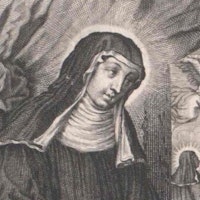Listen then to your Mother and learn moderation! For moderation is the mother of all virtues for everything heavenly and earthly.
Listen then to your Mother and learn moderation! For moderation is the mother of all virtues for everything heavenly and earthly.
Hildegard of Bingen

Mother of All Virtues
Topic: Virtue, Morality, & Ethics
In a true vision I saw and heard the following words: ‘O daughter of God, out of your love for God you call a poor creature like myself, Mother.‘ Listen then to your Mother and learn moderation! For moderation is the mother of all virtues for everything heavenly and earthly.
Hildegard of Bingen (1098-1179) was a Benedictine abbess and mystic of medieval Germany. She was born into a noble family in Bermersheim vor der Höhe, Germany, and entered religious life at the age of eight. She received a rudimentary education, but at the age of forty-two, she began to experience a series of visions that would shape her life and work.
Hildegard described these visions as "the living light," and they were often accompanied by physical sensations such as heat, cold, and pain. She believed that these visions were a gift from God, and she felt called to share them with the world. She began to write down her visions, and she also composed music and poetry to express her spiritual insights.
Hildegard was a prolific writer, and her works cover a wide range of topics, including theology, natural science, medicine, and music. She is best known for her three volumes of visionary theology: Scivias, Liber Vitae Meritorum, and Liber Divinorum Operum. These works are rich in symbolism and imagery, and they offer a unique perspective on the nature of God, the human soul, and the world.
In addition to her writings, Hildegard was also a gifted musician and composer. She wrote over 70 songs, including the Ordo Virtutum, an early example of liturgical drama. Her music is characterized by its simple melodies and its use of plainchant.
Hildegard was a complex and multifaceted figure, and her work continues to inspire and challenge people today. She was a visionary, a mystic, a writer, a composer, a scientist, and a healer. She was also a woman of great courage and determination, and she used her gifts to make a difference in the world.
Hildegard of Bingen was a remarkable woman who left a lasting legacy. She was a pioneer in the fields of theology, natural science, and music, and her work continues to be studied and appreciated today. She was also a powerful voice for women's rights, and she challenged the patriarchal structures of her time. Hildegard of Bingen was a true visionary, and she continues to inspire us with her courage, her intellect, and her creativity.
Book of Divine Works
Hildegard of Bingen, Book of Divine Works, Letter to Elisabeth of Schongua. Edited by Bruce Hozeski. Santa Fe: Bear & Company, 1987.

Hildegard of Bingen
Theme: Virtue Is

About This Hildegard of Bingen Quotation [Commentary]
In her vision, Hildegard of Bingen hears the words: “Listen then to your Mother and learn moderation! For moderation is the mother of all virtues for everything heavenly and earthly.” By calling moderation “Mother,” she identifies it as the source that nurtures and sustains every other virtue. Moderation is not presented as a small practice of restraint but as the ground in which a life of integrity takes root. It orders the relationship between the divine and human, giving strength to both earthly responsibilities and heavenly devotion.
Hildegard emphasizes that moderation “is the mother of all virtues” because it holds the right measure of life together. This is more than avoidance of excess. Moderation, or discretio, is the discipline that creates space for virtues such as love, humility, and justice to flourish. When life is measured with moderation, actions are guided by discernment rather than imbalance. Without it, other virtues lack form and steadiness. With it, they gain coherence, anchored in choices that harmonize human freedom and divine guidance.
The call to “learn moderation” is both practical and spiritual. Hildegard teaches that moderation unites what is “heavenly and earthly,” shaping a life that can discern what nourishes instead of depletes, what strengthens rather than weakens. To recognize moderation as “Mother” is to recognize its generative role in virtue itself. It directs human effort toward balance and discernment, ensuring that the freedom to choose is exercised responsibly, in alignment with the wisdom of God. In this way, virtue becomes a living reality, born and sustained through moderation.
Hildegard of Bingen, Moderation [Further Commentary]
Hildegard of Bingen teaches that “moderation is the mother of all virtues for everything heavenly and earthly.” In her Book of Divine Works, she conveys this through a vision, addressing Elisabeth of Schongau as a “daughter of God” and urging her to “learn moderation.” For Hildegard, moderation—discretio—is more than a virtuous habit; it is a nurturing force that holds together the body’s discipline and the soul’s orientation toward God. She describes it as the meeting point of human effort and divine guidance, a balance where freedom of choice becomes harmonized with the wisdom of heaven. In this sense, virtue is not abstract but arises from moderation itself, which safeguards both earthly life and spiritual growth.
In The Book of Life’s Merits, Hildegard names discretio among her 35 virtues, countering the pitfalls of excess and urging a return to balance. Yet this is not simply avoidance of extremes. Moderation is a conscious and unconscious discipline, requiring reasoned judgment to discern what is nourishing rather than depleting, what strengthens rather than weakens. She calls us to seek the “right measure” in all things, reminding us that discretion shapes the ground on which other virtues take form. In a world where imbalance is often praised as ambition or success, Hildegard’s vision points instead to moderation as the compass of a meaningful life—one in which virtue is sustained by balance, clarity, and alignment with the divine.
Resources
Related Quotes
Copyright © 2017 – 2026 LuminaryQuotes.com About Us